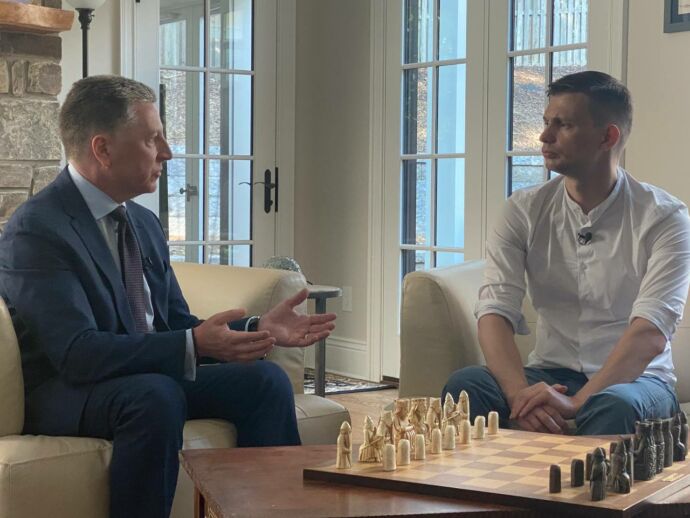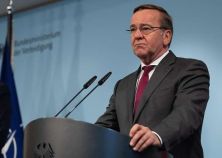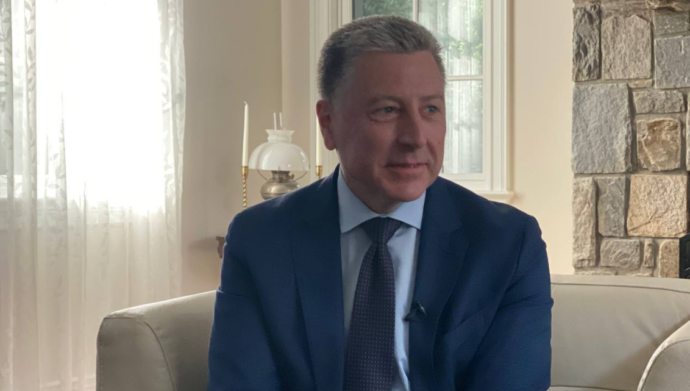Kurt Volker is an American diplomat. He is well known in Ukraine, especially in Donbass. From 2017 to 2019, Volker was the U.S. Department of State special envoy for Ukraine. His main focus was on coordinating the United States’ efforts to resolve the Russian-Ukrainian conflict. He has repeatedly held talks on peaceful settlement of the situation in Donbas and the implementation of the Minsk agreements with the Kremlin leadership, as well as worked with other European participants of the Normandy format – France and Germany. As a special envoy, Walker was remembered for his public criticism of the Putin regime and of the unfair conditions for Ukraine set out in the Minsk agreements.Walker still keeps in touch with Ukraine and visits Kyiv regularly. The interview with UA TV channel, which took place on the eve of the summit of Ukrainian President Volodymyr Zelenskyy and U.S. leader Joe Biden was held in Washington D.C.
Vitaliy Syzov hosted the interview.
Let’s talk and understand our common problems
– What could make the meeting of Volodymyr Zelenskyy and Joe Biden successful for Ukraine and the United States?
– In my opinion, the key point will be to reach an agreement between President Biden and President Zelenskyy: that we are on the same side, that we are trying to do the same thing together. We are strategic partners. We have to solve problems together.
In my opinion, too often we stop talking to each other or have different expectations. The United States is reprimanding Ukrainians too much. You know, maybe a lot is expected of you.
But I think that if we really talk and understand our common problems and interests, we will be able to work successfully on a lot of things.
As I look at the forthcoming meeting of presidents, I see that Ukrainians have certain expectations that this dialogue should be about Ukraine’s security. Ukraine is under attack from Russia, which has seized its territory. Russia has killed 13,000 Ukrainian citizens. It has made more than one and a half million people internally displaced.
In addition, there’s a number of other points of pressure from Russia on Ukraine. For example, the increase in Russian military buildup in April, as well as the threat of absorption of Belarus by Russia. Plus, large-scale military exercises, which will last until September 16, and will begin immediately after this visit (this is the Belarusian-Russian exercise “West-2021” – ed.).
Therefore, I think that Ukraine has every objective reason to believe that the United States is simply obliged to discuss Ukraine’s security issues.
At the same time, I see the United States say, “Dear Ukraine, you have not yet done everything necessary to fight corruption and improve the judiciary, to carry out reforms”. I think the Ukrainian government will also agree to this, but it is not an alternative to security.
And I hope that our two leaders will be able to discuss these issues and reach a full understanding. We are really on the same side of the table, trying to solve problems together.
Ukraine is a stronger state
– Today the whole world is following the situation in Afghanistan. How can Ukraine help the United States solve this problem?
– First, I really think it’s a terrible tragedy. It is very, very disturbing to see the collapse in Afghanistan, the death of many people. This is a very sad result for the Afghans themselves, who built something, built their society, and now everything is falling apart again.
I believe that Ukraine has done a great job in these conditions, helping to evacuate people, helping to deliver them to Kyiv or even further, using its planes and troops. Last week I was in Kyiv, and I saw Afghan refugees in the city, and I talked several times to people who directly helped them get out.
And I think that Ukrainians can be quite proud of the role played by their special services.
I am also convinced that Ukraine’s contribution to NATO operation during all this time has been quite significant. We should understand, there is now a crisis in the United States. There are rumors of new terrorist attacks. The United States still plans to complete the evacuation. But I think we will see worsening of the situation in Afghanistan. In particular, for the United States in the region, which will last for some time.
It is sad, but in this case, I think, first of all, it is important to continue the humanitarian work that Ukraine is already carrying out there.
But I also hope that both leaders realize that despite the fact that Afghanistan’s policy has failed miserably and is a catastrophe, Ukraine can still succeed. Ukraine is a stronger country.
You have a more cohesive, stronger identity. Ukrainians are ready to fight for their country. They are ready to invest in their country as much as possible. I don’t just mean money. I mean political and moral investments.
Investment in security in Ukraine is likely to be much more successful than in Afghanistan. And, perhaps, this topic will become a new narrative generated by the meeting of the two presidents.
– Russian media use the situation in Afghanistan to show the United States in a very negative light. And they are trying to show that Afghanistan is about the same story as Ukraine, and that in the case of Ukraine, we need to prepare for a similar outcome. In your opinion, is it correct to compare the situation in Afghanistan and Ukraine?
– There is not the slightest resemblance here. Afghanistan is deeply divided internally, has a weak central government that is unable to maintain security and stability on its own. And there’s a number of external actors – the United States and other countries – who have tried to help this government build a stronger society. We have left Afghanistan, we are leaving the catastrophe behind.
Ukraine is exactly the opposite. Ukraine is a cohesive country, a powerful country, with mature state institutions and a strong government. It independently maintains security within the country. It does not depend on foreign aid, and it has no problem with the fragmentation of society.
As for the “civil war”, it is external aggression. It is about Russia’s invasion and seizure of Ukraine’s territory.
In other words, there is no parallel between the situations of Ukraine and Afghanistan – there is nothing in common between them.
Of course, Russia is talking to the United States: everything Russia says is aimed at exerting influence. Their messages do not have to be true, but they continue to instill their narratives to play on the psychology of their opponents.
They need Ukraine. They want Europe to believe that the United States will not come to help Ukraine’s and support it. They keep saying it. But I’m sure it’s really the other way around! The United States is a full member of NATO, fully supports Ukraine as an ally in an expanded partnership, and supports Ukraine’s security, supports Ukraine’s reforms and transformations, as well as supports Ukraine’s aspirations to become part of Europe and NATO.
I am convinced that we should not listen to what the Russians are saying. Instead, think about why they say that. What meaning do they put into their messages? They do this to make us doubt ourselves.
Provide help to Ukraine in the issue of security
– The situation with Nord Stream-2. What is the position of the United States? Should Ukraine in this situation count on at least additional military support, new weapons – for example, “Javelins” or other means of defense.
– Yes, I hold exactly this point of view. I think it is time to think about how to solve the security problems of Ukraine, which only intensify with the completion of the construction of Nord Stream-2. Some believe that its launch gives Russia an opportunity to establish ties with Germany, and that such a connection will keep Germany from supporting Ukraine in security matters if Russia intensifies its aggression.
So I think we need to think about what we can do to help Ukraine in terms of security. I see two things.
One of them is, as you said, reliable support in the field of ensuring military security, support for Ukraine’s aspirations for NATO. And also a conversation with Germany about the real way for Ukraine to join NATO. We promised this back in 2008, and nothing happened. And I think during this visit we will see concrete confirmation of U.S. assistance to Ukraine in the field of security.
The second thing the United States could do is help Ukraine with energy security. Ukraine has enough natural resources to become a net exporter of energy. And Ukraine should not depend on Russian gas, oil or coal. Ukraine has the opportunity to be a producer and exporter of energy in order to have full energy independence. This process may require some external assistance, foreign investment and credit guarantees. Technical assistance may also be required. And it seems to me that this is exactly the area where the United States and Germany must commit to Ukraine in achieving that goal.
By the way, this also applies to renewable energy and electricity in the long run, as well as climate change, which is extremely important for both Germany and the United States.
But in the short term, I think it is the development and export of gas and oil that will help Ukraine achieve a much greater sense of security.
– We talked about assistance to strengthen security. The United States will provide an additional USD 60 million to Ukraine. Is such assistance within the normal range or is it an “advance” for a future meeting of presidents?
– Probably, to some extent, this assistance can still be considered a gesture. I think this is an attempt to show an increased level of support. It’s not the same amount – it’s not that big, but it’s not bad. It seems to me that this is a gesture – a demonstration of support for Ukraine and a commitment to such support.

The U.S. has to be involved more actively
– I talked to some former employees of the U.S. Department of State and other former U.S. officials. Many of them believe that it would be great if the United States joined the Normandy format. In your opinion, is it real?
– There are some important points here. First, indeed, the United States needs to be more actively involved in one format or another. A Commissioner should be appointed to be responsible for all matters related to the settlement of the conflict, as I did when I worked with France, Germany, NATO, the OSCE, the EU, Russia, Canada and the United Kingdom. But now there is a gap, and this situation has been going on for several years. I think it is very important for the United States to address this issue more actively.
The second question: what format is needed for this? The Normandy format was created by France and Germany together with Ukraine and Russia. It seems to me that if you ask any of the parties, except Ukraine, they would not want to add the United States to the Normandy format. Russia certainly would not want to. France would not want to. But really, I don’t think it’s that important.
In my opinion, the real problem here is to change the deal with Russia right now. Russia believes that it can continue its aggression against Ukraine at relatively low cost, and without resistance from France and Germany, and without changes in the context of the negotiations. That’s why it continues.
What the United States needs to do is play a leading diplomatic role in convincing France, Germany, NATO, the EU, Britain, Canada, all together, to repel Russian aggression so that Russia can see its situation change and worsen. You cannot just continue aggression and not face any costs or losses.
The situation in Russia will worsen the longer it continues the war. If we can change this account for Russia, then it may at some point say, “Okay, let’s discuss a solution”. And at the very moment when Russia wants to “find a solution,” we must already have it on the table. Minsk documents form the basis for this.
The Ukrainian government is always ready to implement peace agreements in Ukraine. The current government and President Zelenskyy are taking many steps, trying to create a more positive atmosphere.
In turn, Russia simply does not want that. Therefore, it is necessary to make the bill and the price change for Russia. And it’s not in the format at all. It is a matter of mobilizing pressure on Russia to make it realize that such a policy will cost it too much.
– What do you think are the most important moments for Russia – where exactly will it not make concessions to Ukraine? What is unacceptable to it?
– Russians say a lot, and at the same time do not always tell the truth, as practice shows. And they know it themselves. They know that this is not true, and still continue to stand their ground, because they always want to divert the conversation, “turn the arrows”. And it happens all the time.
But sometimes they speak directly and mean exactly what they say. And some of these things relate to the Minsk agreements in the context of restoring Ukraine’s territorial integrity in the Donbas. I think they really do not want to allow Ukrainian troops into the occupied territory of Donbass. They want a transition period. They do not want to just go out and Ukraine to just go in there. Therefore, they require some transition period.
We talked about how to do it, and whether international peacekeeping forces will be a transitional mechanism to monitor the security of territories for a certain period before the arrival of Ukrainian forces.
And this is necessary, because another important thing for Russia is to demonstrate that there is a political process going on there. They say they want to hold local elections. They say they want amnesty. They demand a special status and say that all this is written in the Minsk agreements. But these things, even local elections, cannot happen under occupation!
That is why we need some kind of transitional mechanism, which, again, means peacekeeping forces. There is another idea: it may not be a military force, but, for example, the police – maybe the OSCE-led police – for a transitional period.
And third, Russians now control the international border between Ukraine and Russia, and they do not want to give it up until the last moment. Here, too, it may be necessary to introduce an international presence: to take positions at the border, to monitor and control the border until Russia agrees to finally regain control of the Ukrainian side of the border within the framework of the Minsk agreements.
These are the things that Russia constantly declares.
These are very difficult conditions. Honestly, they are completely unfair to Ukraine, because all these territories are Ukrainian, and this is Ukraine.
Ukraine wants the people who live in these territories today to live better. But to achieve this goal – to eventually achieve the restoration of territory, the withdrawal of Russian troops, the disarmament of illegal armed groups – I believe the use of any of those transitional mechanisms would be necessary.












